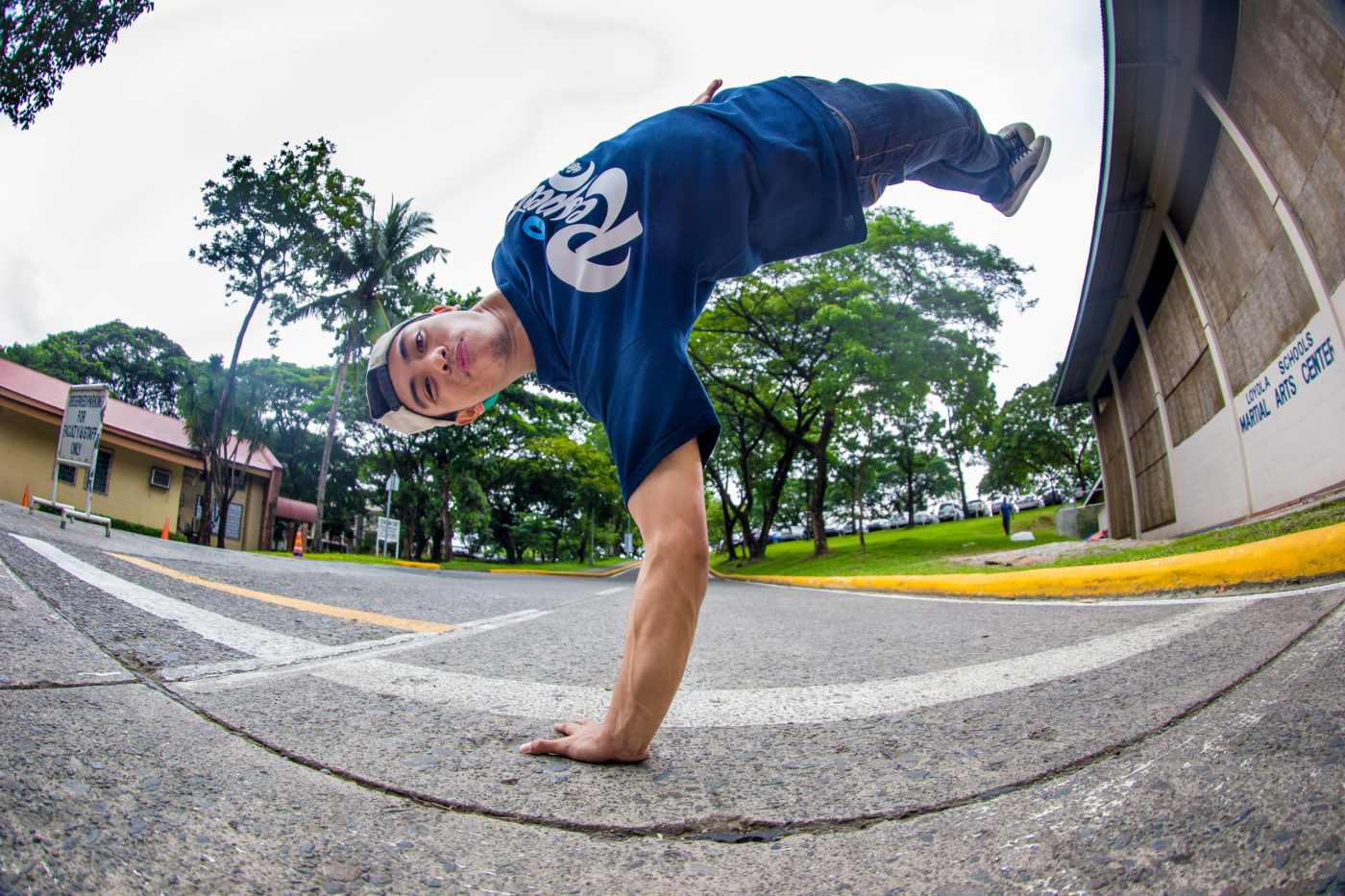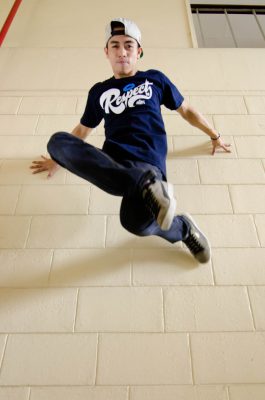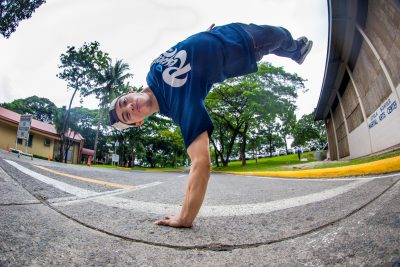It’s not every day that you accidentally win an international competition. But last July 2013, Jesse “Reflex” Gotangco (BFA AM ‘10) did just that.
R16 Korea is an international dance competition for b-boys, a term used for hip-hop dancers who incorporate elements of street and breakdance into their routines. The competition is of gargantuan proportions, with as many as 1,720 crews from 86 different countries participating.
On a whim, Reflex joined the competition and nabbed the championship for the solo category last July 14. It was the first time the Philippines ever had a solo representative and the first time the country actually won a competition of this kind.
“I couldn’t believe what was happening. [It made me think], do I deserve this? Am I this good? Nakatsamba ba ako (Was I just lucky)?” Reflex says with a West Coast twang, a product of his frequent visits to California to visit family. “It was so surreal.”
But more lies behind his victory than it just being a pleasant surprise. After the bell rings and his students are dismissed from his classes on the Foundation and Fundamentals of Breakin’ (PE141), Reflex talks to The GUIDON about his experiences, dance culture in the Philippines and trying to get an underappreciated art form off the ground.
Getting into the rhythm
For Reflex, dance started out as a childhood hobby. “As a kid, walang hiya (I didn’t have any shame)—just did my own thing,” he shares. At six years old, the young Reflex would stand in front of the TV screen and unabashedly copy Michael Jackson’s music videos.
But it wasn’t until high school that he started enrolling in formal dance classes. From there, Reflex joined competitions and began building his network. In college, he was an active member of the Company of Ateneo Dancers (CADS) and received the Loyola Schools Award for the Arts in Dance in 2010.
During and after college, Reflex competed locally and internationally as a member of different groups. For R16, he initially joined the crew category with Soulstice, a group that includes Ateneo students and graduates. But when a series of unfortunate events convinced the group against joining the competition’s qualifier, it didn’t stop Reflex from competing on his own.
After flying to Singapore to support fellow Filipino representatives Sass Crew in the Southeast Asian regional round, Reflex ended up joining the Solo category, and the rest is history.
But Reflex got himself sick during the week of the finals. Upon his return to the Philippines, fatigue and the dismal weather took their toll on his body. “I wasn’t able to train for four days,” says Reflex. That left him with barely three days to warm up and prepare for the finals in Korea.
“He’s always been one to go after what he wants and doesn’t really let anything stop him,” says information design junior Rocky Alli, a member of CADS and Soulstice.
His crewmates describe Reflex as “serious but very light” during practice and training sessions. He maintains a relaxed, positive environment but is still very productive. As a full-time dancer, a regular instructor and an event host, Reflex never stops.
The state of the nation
Hip-hop is the form of dance that has made the biggest impact on Reflex’s life. Though the movement began in the streets of New York City, where the downtown youth needed an escape from the hard life, he sees how it can resonate with the Filipino community as well. “People had nothing and made something out of it. [They] tried to have fun and do something positive,” Reflex explains. To him, this is a concept Filipinos have no trouble identifying with.
In fact, the international b-boy scene has also recognized our country’s potential. “Foreign crews come to the Philippines because they’re curious about the ‘raw, aggressive’ style displayed in competitions,” says Alli. Unfortunately, international recognition doesn’t always translate to local support.
Reflex shares his dream of getting a level of backing from the Philippine government similar to what the Korean government gives dance competitions like R16. The Korean Tourism Organization and the Seoul government each allot 500,000 dollars for the organization of the event each year.
In 2009, according to Reflex, the total budget allotted for the event reached three million dollars. “That’s why everything was free,” he said enthusiastically, giving off the same playful and relaxed disposition he has while teaching. “[My] flight, stay, buffet—you name it.”
On the other hand, not all dancers in the community agree that the Philippines is ready for that kind of support. Some feel that Filipinos need to mature and change their attitudes towards fellow locals who make it to international levels.
Reflex acknowledges the room for improvement, saying, “[Back then], we didn’t have as much exposure to what real b-boying really was worldwide.”
The dancing community might not be in agreement about what sort of support b-boying deserves, they’re unified in their understanding that the Philippine breakdance scene could still do with some strengthening.
Pushing further
The main principles of b-boying are being original and innovative, things Reflex always challenges himself to achieve in his own dancing.
“A breakdancer is someone who does tricks and crowd-pleasing moves. A b-boy is someone who can do that but is on beat and is original,” he says. “What he does always flows, and [makes a] statement.” In fact, he earned the nickname Reflex because his moves were always perfectly attuned to the music, as if dancing were a prime instinct.
Though dedicated dancers have been trying to establish b-boying as a style of its own, most people who aren’t well versed in dancing culture tend to lump all hip-hop culture together. As a result, b-boying has had trouble gaining steady ground as an art form.
Class differences play into its struggle to gain legitimacy. To be accepted as art, a phenomenon traditionally requires backing from the elite, something that b-boying lacks.
“Street dance and b-boying are products of street culture, low-income neighborhoods and, in America, minority groups,” explains Ricardo Abad, PhD, a professor at the Sociology and Anthropology Department. “That’s low-class kuno, so [hip-hop] can’t be art because it’s not sophisticated or studied [which is an] elite judgment.”
“[Some say] you can’t make a living out of dancing—that’s not true.” – REFLEX GOTANGCO, R16 SEA Solo Champion
It’s exactly this rigidity that b-boying seeks to challenge with its flow and originality. Reflex says, “[Some say] you can’t make a living out of dancing—that’s not true.” According to him, there’s a way to turn passion into something sustainable. “[You have to] manage and market yourself, network, communicate, and [be] good at what you do… It’s also coming up with the business side of dancing, [selling] apparel, putting up classes or doing commercials and endorsements.”
Moving forward
In recent years, things have started to take off for b-boying internationally, as evidenced by the success of Filipino dancers. It has had its struggles, but there is promise. Counting on the passion of those who engage in it and the apparent presence of raw talent, it seems the only way it will go is up.
“My mother and sister told me, ‘After college, you have to look for a life, not a job.’ That’s why I [chose to] dance,” Reflex says.
His crewmates consider him an inspiration for pursuing what one is most passionate about. Getting b-boying as far as he has, even in the face of difficulty, makes things seem possible for Filipinos. Even at the mouth of a challenge, stopping is never an alternative for him—every step is a reflex.
- ON THE STREETS. R16 Korea SEA Solo Champion Reflex Gotangco is out to change the Philippine dance scene one stage at a time. PHOTOS by Kat. A Mallillin and Arthur Tan










